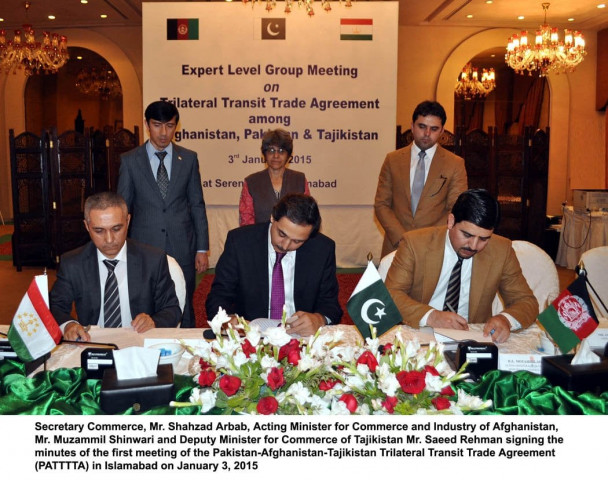Trilateral deadline: Draft of transit trade deal to be ready in 3 months
Pakistan will gain access to landlocked Central Asia in return for use of ports.

Commerce Secretary Shahzad Arbab (C), Acting Minister for Commerce and Industry Afghanistan Muzammil Shinwari (R), Deputy Minister for Commerce Tajikistan Saeed Rehman (L) signing the minutes of the first meeting of the Pakistan-Afghanistan-Tajikistan trilateral transit trade agreement in Islamabad on Saturday. PHOTO: PID
Pakistan, Afghanistan and Tajikistan have agreed to reach a conclusion in negotiations over a transit trade agreement in three months, which will provide Pakistan access to markets of five landlocked Central Asian states in return for giving rights to use its ports.
The three countries set the deadline to finalise a draft during the first expert-level meeting for the Trilateral Transit Trade Agreement in Islamabad on Saturday.
The negotiations are taking place at a time when a bilateral transit trade deal between Pakistan and Afghanistan is going to expire later this year. The Afghanistan-Pakistan Transit Trade Agreement, known as APTTA, will complete its time period in October this year after remaining in force for five years.
The trilateral arrangement would be seen as an important step towards deepening trade collaboration among Pakistan, Afghanistan and Tajikistan.
Commerce Secretary Shahzad Arbab, Afghanistan’s Acting Minister of Commerce and Industry Muzammil Shinwari and Tajikistan’s Deputy Minister of Commerce Saeed Rehman led their respective delegations in the meeting.
“Details of a future trilateral transit trade agreement were discussed and the three countries decided to step up the process of consultations to reach conclusive decisions,” said a press release issued by the Ministry of Commerce.
They nominated their representatives for technical discussions and agreed to meet in Dushanbe in February with the first draft of the trade accord.
They also reached consensus on preparing the final draft in March, which may be signed in Kabul.
“Operational modalities of trilateral and bilateral agreements came up for discussion in the talks,” said Shahzad Arbab, the Secretary of Commerce.
However, he said it was not yet clear whether Pakistan and Afghanistan would make Tajikistan a partner in the APTTA or propose a separate agreement.
Arbab said the mutual dependence of countries of the region was providing a chance to benefit from a host of opportunities by connecting and linking with each other. “Pakistan is very keen to establish trading links with neighbouring countries, as well as Central Asia, and provide them the link to the world through warm seas in the south of the country.”
Expressing his views, Afghan minister Muzammil Shinwari said the signing of the transit deal would be a win-win situation for the three countries in particular and the whole region in general. The accord would be a milestone in achieving regional and economic integration, he said.
Shinwari pointed out that it had taken nine rounds of talks and an entire year to finalise the APTTA but with the keen interest of participants, the trilateral deal could be reached in a much shorter time.
Tajik minister Saeed Rehman described the proposed common transport corridor as a project that would greatly enhance regional trade and investment and attract foreign investors because of its highly lucrative economic potential.
Coordination authority
Pakistan and Afghanistan concluded the fifth round of talks on a joint transit trade coordination authority. Issues relating to electronic data interchange, measures aimed at reducing the transit cost, facilitation at ports of Karachi, training Afghan officials for swift registration under WeBOC, pending insurance guarantees with Afghanistan and a single goods declaration format were considered.
The two countries also revealed their stance on the establishment of joint business councils, multiple-entry visas for Pakistani workers, cooperation agreement between Afghanistan’s Customs Department and the Federal Board of Revenue, automation of Goods Declaration at Torkham border for Pakistan’s export items and verified invoices for goods entering Afghanistan.
Published in The Express Tribune, January 4th, 2015.
Like Business on Facebook, follow @TribuneBiz on Twitter to stay informed and join in the conversation.



















COMMENTS
Comments are moderated and generally will be posted if they are on-topic and not abusive.
For more information, please see our Comments FAQ